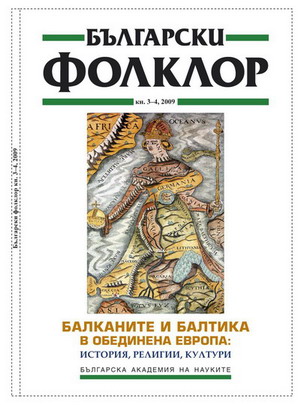Конкурсът за песен на Евровизия: case study за малцинствата и мнозинствата
The Eurovision Song Contest: a Case Study on Minorities and Majorities
Author(s): Triinu Ojamaa, Kanni LabiSubject(s): Cultural Essay, Political Essay, Societal Essay
Published by: Институт за етнология и фолклористика с Етнографски музей при БАН
Summary/Abstract: Background. The Eurovision Song Contest (ESC), established in 1956, is the longest-running song competition in the world. The ESC is broadcast live in over 30 countries, and according to different sources 300 to 600 million viewers watch it every year. Nevertheless, we can find very few scholarly studies, which especially deal with this event. In addition to some articles only a couple of books have been published, e.g., A Song for Europe. Popular Music and Politics in the Eurovision Song Contest. Aim and method. The main aim of the current paper is to analyse the discourse on the level of topics in media on the ESC of 2007 that took place in Helsinki. The study bases on 187 articles published in Estonian, Russian-Estonian, Finnish and Bulgarian dailies and about 6000 commentaries in the Internet. Results. The analysis reveals which topics other than music would arise, motivated by the ESC. These are: falling prestige of the ESC, regional voting principles, national politics (incl. “Balkanization”), invasion of the gay culture, and singers' private life. In our paper we mainly concentrate on the national politics and gay culture – the problems of minorities and majorities. In general, the first topic was treated similarly in the media of different countries: first of all the articles dealt with the problems of their homeland and neighbours and also with the “Balkanization” that was the centre of attention in 2007. Concerning the second topic some differences emerged: in the Estonian, Russian-Estonian, Finnish and Bulgarian dailies the attitude to the interrelation of the ESC and gay culture stretched from tolerance (Finnish media) to denying (Russian-Estonian media).
Journal: Български фолклор
- Issue Year: XXXV/2009
- Issue No: 3-4
- Page Range: 077-083
- Page Count: 7
- Language: Bulgarian
- Content File-PDF

